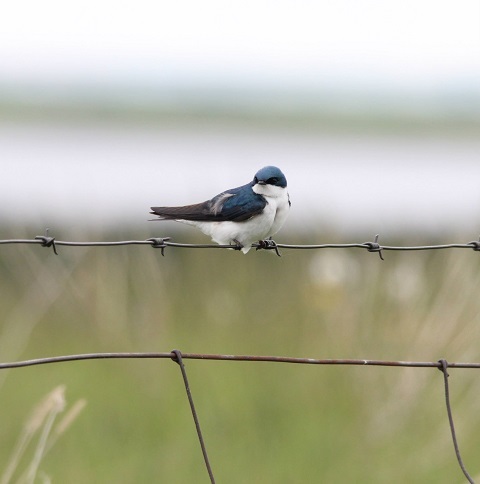How to fend off mosquitoes

Attract mosquito-eating chickadees, house wrens, bluebirds, swallows and martins with birdhouses and bird baths. (Credit: James Andruchow)
As an Alberta girl, I know mosquitoes.
I also spent five summers working in the boreal forest counting critters -- and inadvertently feeding skeeters, no-see-ums and deer and horse flies.
Bug spray ingredients often don't break down. Some linger and can cause harm to plants and animals other than their targets. Avoid DEET and you'll never rinse it into our oceans, lakes or rivers.
Before you reach for a DEET bug repellent, try these non-toxic tips to make you and your home less attractive to mosquitoes:
Remove standing water (mosquito breeding grounds). Refresh bird and bee baths daily.
Fill, cover or remove backyard items that collect water -- empty planters, kids' toys, wheelbarrows, etc.
Keep gutters clean to help rainwater flow freely.
Repair screens on doors and windows.
Keep grass to about three inches. Trim shrubs.
Attract mosquito-eating chickadees, house wrens, bluebirds, swallows and martins with birdhouses and bird baths.
Avoid synthetic fragrances. Mosquitoes love scents in soaps, lotions, shampoos, perfumes and laundry detergent.
Cover up with long sleeves, long pants and socks.
Wear light-coloured, loose-fitting, long-sleeved shirts, long pants and socks. Tuck kids' pants into their socks for extra protection.
When you go camping, take a bug net (for your head) and bug shirt. They will keep you sane.
Try herbal repellents with citronella, cedar, eucalyptus, lemongrass or peppermint essential oils. They're safer for children (but not on babes under two years). The Centre for Disease Control found some products with offer long-lasting protection (but not recommended for children under three). (Note: They also recommend DEET and permethrin.)
Avoid DEET
DEET is a registered pesticide with warnings to avoid eyes, mouth, ears, cuts and irritated skin. It's also a suspected neurotoxin and respiratory toxin. Researchers from the London School of Hygiene and Tropical Medicine found that about half of Aedes aegypti mosquitoes developed immunity to DEET just three hours after exposure.
DEET can damage synthetics -- plastics, rayon -- as well as furniture finishes, leather, and paint. When I was working in the field I saw DEET melt the dash of a car and eat the wood of my field pencils! That's why I stopped putting it on my skin.
For most Canadians, the risk of getting West Nile virus or Lyme disease is low, and the risk of serious health effects is also low...today. Health Canada suggests reducing your risk by making yourself less attractive to mosquitoes, but also recommends DEET concentrations for different age groups if you find yourself at high risk.
What are your summer tips and tricks?
Sincerely,
Lindsay Coulter, a fellow Queen of Green
Hey! Want more DSF? Join David Suzuki on Facebook

David Suzuki's Blog
- David Suzuki's profile
- 248 followers



